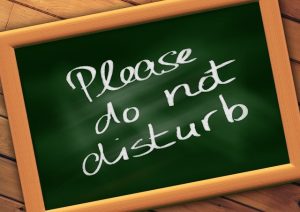 When it comes to certain jobs, a split second distraction can have dire consequences. If the job involves driving, operating power tools or machinery, if you work in a kitchen, near traffic, or around anything that’s hot, loud or heavy, you generally can’t afford to take your eyes off the task at hand. Unfortunately, daily life in the 21st Century is simply packed with distraction from the moment you wake up to the minute you hit the hay. Here are some tips for making sure that those distractions don’t affect the job.
When it comes to certain jobs, a split second distraction can have dire consequences. If the job involves driving, operating power tools or machinery, if you work in a kitchen, near traffic, or around anything that’s hot, loud or heavy, you generally can’t afford to take your eyes off the task at hand. Unfortunately, daily life in the 21st Century is simply packed with distraction from the moment you wake up to the minute you hit the hay. Here are some tips for making sure that those distractions don’t affect the job.
Phone-Free Zones
An easy way to eliminate distraction numero uno: Simply don’t allow phones in any part of the workplace where you’re going to need to stay vigilant around forklifts, table saws and scaffoldings. Keep a plastic container, a shoebox or a desk drawer near the entrance so that workers and visitors can leave their phones somewhere handy without being distracted around hazards.
Sweat the Small Stuff
When it comes to minor annoyances throughout the day, it’s best not to get worked up about the small stuff. When it comes to workplace safety, on the other hand, it’s the small stuff that creates a domino effect that can lead to serious injury. Fuzzy dice dangling from a driver’s rearview mirror, for instance, can create a moment’s distraction when you need it the least. Somebody turning the radio up too loud in a loading zone can prevent them from hearing when you yell “duck!” Do a sweep of dangerous work areas now and then and make sure that there’s nothing to divide your employees’ attention.
Key Personnel Only
There’s usually nothing wrong with letting people visit you in an office setting, but you don’t want people visiting a warehouse or a factory or a construction site unless they absolutely need to be there. Letting friends and family members come and go from a dangerous work site as they please is a recipe for disaster. If someone doesn’t wind up being distracted talking to someone who shouldn’t be there, then the person who shouldn’t be there is likely to get hurt. If people need to visit, and they don’t absolutely need to be on the floor, let them do their visiting outside, in the lobby, anywhere but around the heavy machinery.
Keeping a distraction-free workzone really comes down to common sense: Do a walkthrough of the area, and anything that catches your attention will probably catch someone else’s attention at just the wrong moment.





